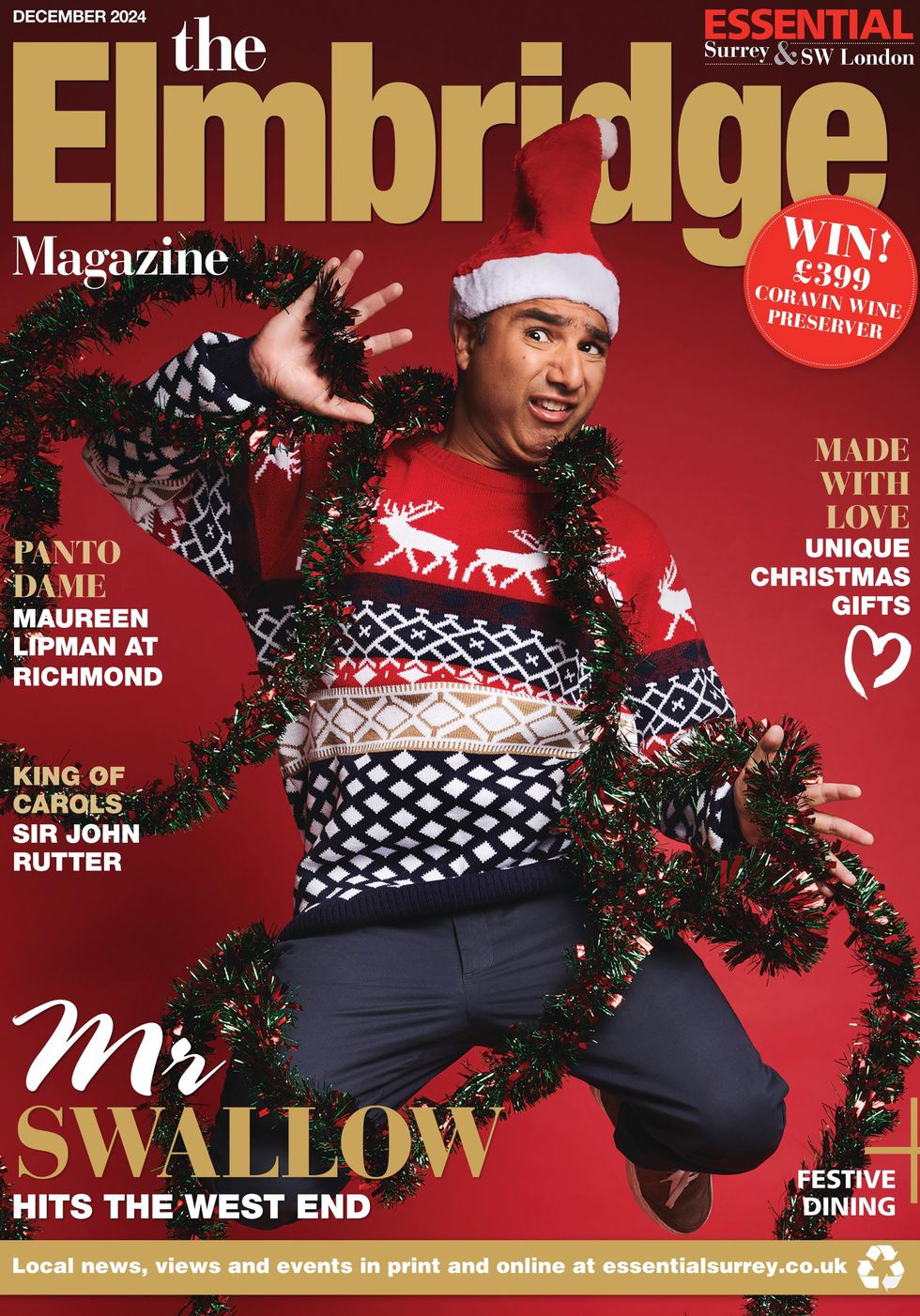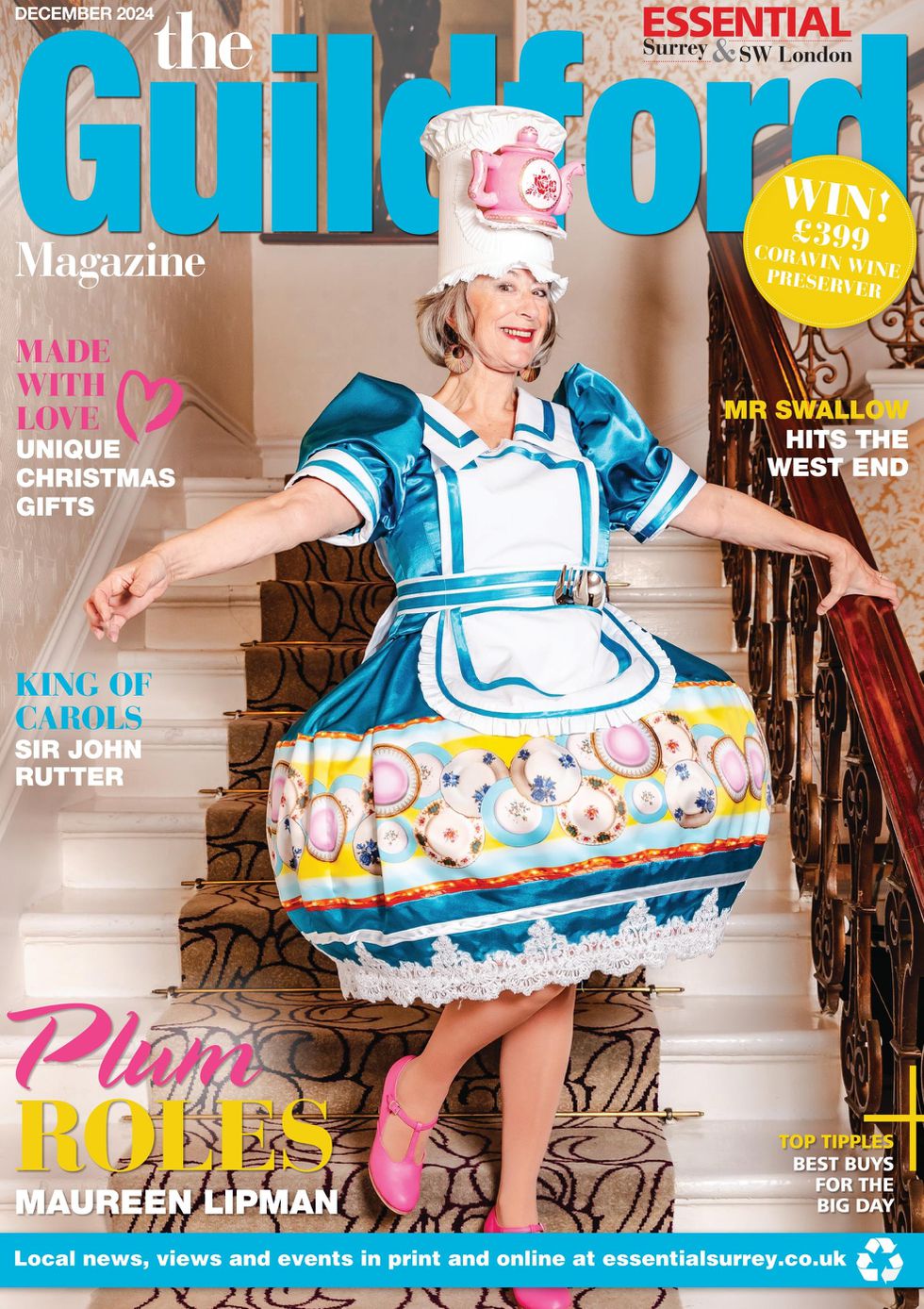
Our favourite James Bond, Roger Moore, is coming to Guildford in October on his national speaking tour. Rob Edwards spoke to the living legend when last he came to town
Everyone has a favourite James Bond. Youngsters say incumbent Daniel Craig has nailed the part, while the older generation will tell you that Sean Connery remains the unsurpassed original. But it is Sir Roger Moore, who embarks on a national speaking tour this autumn, who frequently tops the polls as the best ever 007.
Owner of perhaps the most famous eyebrows in the history of acting, Moore played Bond as witty, distinctively debonair and undeniably suave. It seems apt that I have been asked to call the veteran actor at his apartment in Monte Carlo – a location synonymous with high rollers, yacht owners and undeclared incomes.
Turning 88 just days before his appearance at the Yvonne Arnaud Theatre in October 2015, Moore is no spring chicken – a fact of which he constantly makes light. Monaco’s extreme heat has forced him to throw the windows wide open, and the coastal winds have sent his paperwork scattering.
“It’s the most extraordinary thing,” he laments, as he scours the room for his upcoming tour schedule, only to find it on the floor nearby. “This happens with advancing years.”
An Evening with Roger Moore will feature insider stories and exclusive anecdotes from an extraordinary career that has included iconic TV series The Saint and The Persuaders (co-starring Tony Curtis), Hollywood blockbusters and, of course, seven legendary James Bond films.
Gareth Owen, who manages Moore’s production company at Pinewood Studios, will interview the living legend on stage before opening the floor to questions. Owen is an authority on his subject, having co-authored Moore’s official career biography and ghostwritten both his autobiography, My Word Is My Bond, and his book Bond on Bond, marking 007’s 50th anniversary.
“People didn’t seem too bored on the last tour,” jokes Moore in his deadpan style. Getting a straight answer from the man is like interrogating the master spy himself. “I didn’t hear any snoring and I suppose there was a smattering of applause.
“I’ll talk about my origins, my work for charity, Bond of course, my friends, and a whole lot of other lies that I can dream up,” he chuckles.
“I also talk a lot about my wife,” he adds with haste. “She hits me if I don’t.”
One joke a little near the knuckle perhaps. Moore has spoken candidly about the violence he suffered at the hands of his first two wives, ice skater Doorn van Steyn – who once threw a teapot at him – and vocalist Dorothy Squires, who smashed a guitar over his head.
His third wife, the Italian actress Luisa Mattioli, gave Moore his daughter and two sons, while his relationship with wife number four, multimillionaire Kristina Tholstrup, seems very happy.
“I’ve been so lucky. Lucky to find a wonderful wife and lead a wonderful life,” he says, allowing a fleeting glimpse behind the clowning exterior.
Born in Stockwell, South London in 1927, the only child of a policeman, George Moore, and his wife Lillian, he was educated at Battersea Grammar School (Moore fondly remembers his striped blue blazer), Dr Challoner’s Grammar School in Amersham, Buckinghamshire, and later Durham University, although he did not graduate.
Earlier, during the war, Moore had been evacuated to Devon.
“As a parent, it’s hard to imagine how you could pack children off like that,” he says sadly. “I remember us being herded along at Waterloo station with our cardboard labels and gasmasks.
And his arrival at a remote village hall was equally traumatic.
“We were lined up like lumps of meat waiting to be chosen,” he recalls.
The experience may well explain why Moore has devoted 23 years to UNICEF, the United Nations Children’s Emergency Fund. Serving as a Goodwill Ambassador, for which his CBE was advanced to a knighthood in 2003, he campaigns passionately for the protection of children caught up in conflict.
“I saw it first hand when I was sent to Germany,” he says, recalling his 1946 conscription. (“I waited until all the violence had ended, like the coward I am,” he jokes.) “I remember seeing those poor children – starving little mites. That, of course, is where UNICEF was born.
“Its work is vital in shaping the next generation, providing healthcare and clean drinking water,” he adds, branding events in Syria as “utterly abominable”.
“I do the charity work for the simple reason that I’m able to. Audrey Hepburn, a dear friend, inspired me. She did it for three or four years before she died.”

Moore made his screen debut in 1945, as an extra in the film Caesar and Cleopatra. He was just 17. He then did a brief stint at RADA before national service beckoned, and later worked as a model before winning a contract with MGM in the 1950s.
Initial success came through the TV series Maverick, in which he replaced James Garner for the 1960-61 season of the comedic Western. Then, in 1962, Moore won global recognition for his casting as Simon Templar in The Saint.
Running for six seasons and 118 episodes until 1969, this was one of the longest-running series on British TV, and it was through the role of Templar that Moore developed the character that he would later bring to James Bond.
Serving longer than any other actor, Moore clocked up 12 years as Bond, from his Live and Let Die debut in 1973 to his retirement following A View to a Kill in 1985. He is also the oldest actor to have played Bond – donning his tux at 45 and finally holstering his Walther PPK at the age of 58.
Why was he so successful as 007?
“I look like a hero! That’s my talent!” he laughs.
In fact, he starred in some of the most iconic of the Bond films, including The Man with the Golden Gun, The Spy Who Loved Me, Moonraker, For Your Eyes Only and Octopussy. But was he ever concerned about becoming typecast?
“I’d be sent all sorts of scripts with guns and bombs and explosions,” he gripes. “I hated it.”
That said, you could imagine a geriatric Commander Bond dressing and behaving very much like Sir Roger. Strip away the bullets and baddies, and it seems he’s largely playing himself.
As such, his Bond was very different from the cold, heavy drinking thug created by Ian Fleming. Moore’s 007 was a swaggering playboy, his performances often comical in flavour. Was this a deliberate break from Connery’s harder edge?
“If I ever brought wit to the part, that’s probably because I didn’t really know what I was doing,” he jokes, critical of his own performance in the shadow of his predecessor.
So what does he make of Daniel Craig, the latest Bond incarnation?
“He looks like a fellow who’s going to kill people,” he says with sincere respect. “I like the whole approach. In fact, I think Skyfall is possibly the best Bond ever made. Daniel and Judi Dench were wonderful together. Sensational casting.
“I always said Sean was undoubtedly the best. But I may have changed my mind. Daniel will be remembered. But choosing your favourite Bond really depends when you started seeing the films. People always give their age away when they say.”
Moore certainly gives his away, dropping in frequent self-mocking references to the ill-health he’s battled for decades. He has overcome prostate cancer and two bouts of pneumonia, and had a pacemaker fitted following a collapse in 2003. Has this shaped his attitude to life?
“You mean am I getting ready to shake hands with the devil?” he asks with feigned menace. “Put it this way: I’m about to release another autobiography. It will take me a while to sort out all the spelling and grammar, but the title – and I hope they’ll let me get away with it – is One Lucky Bastard, which is what I am. I’ve been lucky to have good doctors.
“I’m most proud of my three children and my grandchildren,” concludes Moore, as we wrap up our chat. “But I’m also proud that I’ve been able to appeal to people. I know that sounds pompous. Maybe I am! I’m just happy to have been around long enough to do something.”
Roger Moore is at the Yvonne Arnaud Theatre on October 18










